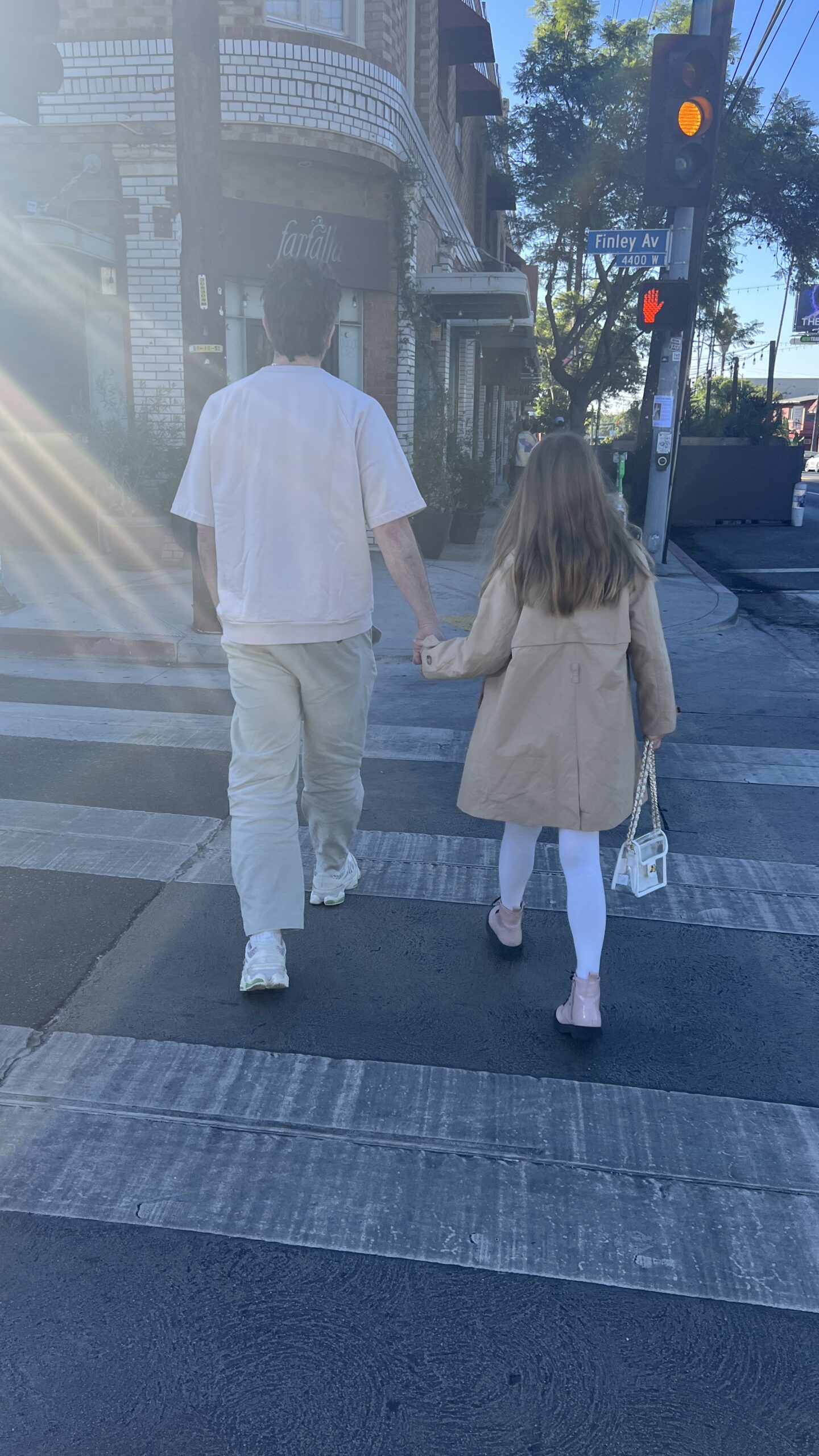
Until recently, the last wedding I’d attended had been as the flower girl. But the further I get from my college graduation, the more high-pitched Facetime calls (“I SAID YES!”), Save the Dates, RSVP cards, links to registries, and even spreadsheets of table arrangements I receive. It’s thrilling to see so many couples I know and love making a public commitment to each other but has also made me realize how little I know about attending weddings, so I decided to turn to etiquette royalty, Lizzie Post. Her great-great-grandmother, Emily Post, literally wrote the book on Etiquette, which Lizzie has since co-authored updates of (it’s now in its 19th edition!) in addition to co-hosting the podcast Awesome Etiquette which addresses a wedding question in every episode. In short, she knows her stuff.
I’m not sure what I expected when I emailed her, but it’s the first time in recent memory I’ve signed an email “Sincerely,” or answered my phone, “Good afternoon. Leslie speaking.” Instead, the person who called was warm, funny, and, yes, had perfect manners—but was anything but stuffy. She explained that manners aren’t (just) about knowing which side of the place setting oyster forks go on, but about addressing other people and situations with “practicality, consideration, respect, and honesty.”
“You’re actually a classic case!” she told me over the phone, “Most people realize how important etiquette and manners are during big milestones like births, graduations, funerals, and marriages. Etiquette gives you a roadmap of comfort to follow, because every wedding is at the very least an exchange of vows or intent, whether you’re Meredith and Derek in Grey’s Anatomy and get married on a Post-It, or tie the knot at a gigantic 750-person wedding. Having that roadmap—as a guest or as the couple—gives you a feeling of comfort.” Read on for her takes on some of my most pressing wedding guest etiquette questions:

Is it ever okay to decline being in the wedding party?
Yes absolutely, and more people should do it as it would save more friendships. The best way to do so is when that friend calls or emails with that request, do not say yes right away. Focus on how flattered you are and how honored you are by the invitation, and then let them know that you can’t accept the honor until you have a clear idea of what will be expected of you. It’s so easy to immediately say, “Of course!! I can’t believe you’re getting married. YAY!” but then you get an email that says you need to wear this dress, get a tan, and get your hair done—and suddenly you’re in way over your head.
On the flip side, as the bride, it isn’t kind to ask and invite people who you know aren’t in a good position to accept. It’s important to pick people who can be there and play the role of bridesmaid really well, because these are the people who are going to be making your wedding dreams a reality. Just recognize that not everyone can drop everything.
If you’re incurring too many costs as a bridesmaid (i.e., the dress, travel, etc.), can you politely decline costs that go over your budget?
This is really hard. Once you agree to being a bridesmaid, you’ve essentially signed on to do whatever the bride is going to tell you to do—which is why it’s important to ask questions up front. If you haven’t been able to do that or the bride started casual then got fancy, its okay to speak up and say, “I am so happy to support you but we’re pushing up on a budget I can’t accommodate, so I may need to back out a bit.” Just be careful that you don’t come across as judging them for having the wedding they want—be sure to support them in their expectations, but let them know you can’t commit in the way they’re looking for. Chances are they’ll understand and choose you still joining over the finances and find a way to make it work.
How do you know if you can bring a ‘plus one’? (And is it ever appropriate to ask for one?)
You may never bring a ‘plus one’ unless it’s explicitly stated, and you should never ask for a ‘plus one.’ That being said, the only exception is if you and your significant other have been together for a substantial amount of time, and have hung out on multiple occasions with the couple getting married. In that case, it’s acceptable to call and ask if there was a mistake, making it clear that you understand either way. Call and say, “I received your invitation and am so excited, but I just wanted to check if there was a mistake leaving Jim’s name off?” If they did it on purpose, then you know who you’re dealing with and can decide to attend, or not to attend. That being said, not inviting a both partners of an established couple is pretty crummy and poor etiquette—if a couple is established, always invite the couple together.
The difference between a ‘plus one’ and invited guest: If both names are on the envelope, you’re both invited. ‘Plus one’ is only used when you’re not aware if someone has an established partner. In that case, a couple may give a guest a ‘plus one’ as a courtesy, but this doesn’t mean they necessarily have to bring a romantic date.

Is it ever appropriate to purchase a gift not from the registry?
Absolutely. You should always give within your budget and whatever you feel confident with. It’s perfectly okay to go off from the registry—people need to remember the registry isn’t the only option for gift giving and you should never expect to receive everything on your registry.
In terms of creating a registry, be sure there are a variety of gift options. I’ve seen a number of registries where there’s nothing under $100. Include gifts that are special, of course, but also be really careful that your registry doesn’t look like you’re using it as an opportunity to take advantage of friends and family and upgrade your life.
How much should you spend on a wedding gift(s)? Is there some sort of equation to figure it out?
The length of time you’ve known them, cost of plate per head, what they gave you—none of it matters. The only thing that matters is if the gift fits in your personal budget and comfort level.
First of all, a couple shouldn’t be putting anything on their registry that they’d be offended to receive. If that’s how they operate, it may be worth reconsidering the friendship. Buy what you can afford—if you can only afford the $20 placemat set, then that’s what you should feel comfortable contributing. You are a friend of theirs who they love and appreciate. If you walk around thinking people will think less of you based on the money you spend, it will devalue you.
If you can’t attend the wedding, should you still buy a gift?
It’s really kind, so if possible: yes. Weddings are the only invitation we suggest this for and we suggest you send a commemorative token or a sweet sentimental gift that marks the occasion because these people are inviting you to celebrate the biggest commitment they’ve made and that’s worthy of a little something.
If invited to the wedding shower, should you purchase a second, separate gift (and if so, should it be off the registry)?
Yes, you should purchase an additional gift but it does not have to be off the registry. This goes for any party you’re invited to that involves gift giving. If you decline, you do not need to send a gift.
In terms of budgeting for additional gifts, create a budget at the beginning. Just because you’re buying more gifts doesn’t necessarily mean you need to spend more money. If my budget for a friend’s wedding is $100 then I would definitely think to myself, “Before I buy the wedding gift, I’m going to wait to see if I’m invited to the shower.” If I’m invited, then I might spend $50 on each the shower and wedding gift; if I’m not invited, I’ll spend the full $100 on the wedding gift.
Should you ever bring the gift to the wedding, or just send it to their home?
It’s okay to ask the couple what they prefer. I’ve seen people bring gifts and I’ve also seen couples ask that you not bring them so that they don’t have to deal with getting them home. It’s perfectly acceptable to call and ask before the wedding.
Should you add a personal touch to gifts from the registry?
You don’t have to, but it’s a great idea and so appreciated. If the registry doesn’t allow you to add a note, write a handwritten one to send or attach to it. Beyond that, it can be a thoughtful way to make the most of your budget—let’s say you have a $100 budget and purchased a cheese tray that was only $50. Consider purchasing some nice cheeses that arrive at the house once they’re back from their wedding or honeymoon, as a personal touch.

How strictly should you follow the dress code? And if you have questions about it, who should you ask?
First of all, the only dress code you should ever designate on an invitation is ‘Black tie.’ If you have a specific attire designation, put it on the wedding website and spread it via word of mouth. If you have any questions, it’s perfectly acceptable to ask the mother of the bride or someone in the wedding party, or even call the couple to ask.
Is there anything you should never wear to a wedding?
Beyond a white wedding dress… I hate saying “never” because you have nudist and camo-themed weddings!

If you’re running late, should you still attend the ceremony, or just join for the reception?
You should try to attend the ceremony as best you can. But, depending on how the space is laid-out, you may need to wait outside until it’s finished if you can’t sneak in quietly through the back. Generally speaking, couples would rather you be there than miss it entirely—but hold the door quietly.
Is it appropriate to take photos / video of the ceremony on your phone?
Absolutely, as long as there is no signage or announcement that specifically says not to do that. That being said, I also really like to encourage people to be in the moment. It’s great to take your phone out but you don’t want your entire experience to be through a 5.5-inch screen.
Is it appropriate to reach out to the couple the weekend of the wedding with questions, and if not who do you reach out to?
You really want to reach out to the bridal party or the family of the couple instead because those people can run it up the flagpole and get the couple’s attention if it’s worthwhile.
Thank you to Lizzie Post for taking the time to chat with me, and for the readers I reached out to for their contributions and second opinions to this post, particularly Jacqueline Chavez (who’s attended 15+ weddings!).
I’d also love to hear: Do you have any etiquette questions from the couples’ perspective, or interest in follow-up etiquette posts?





